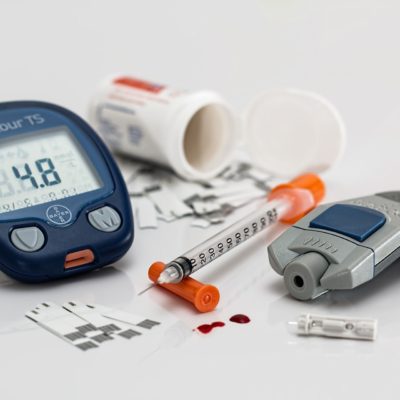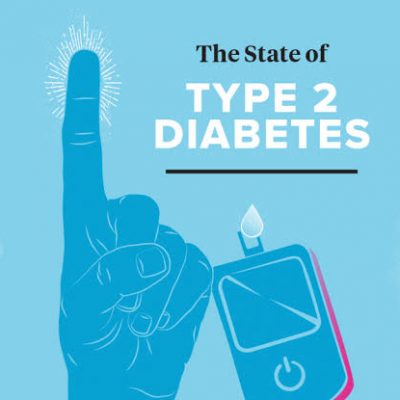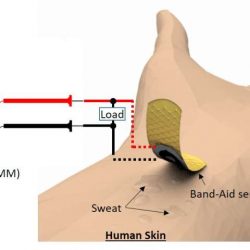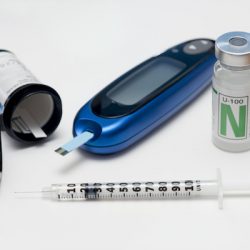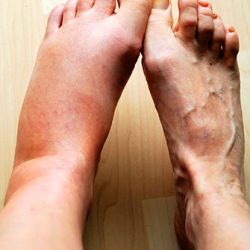Obesity increases the risk of developing type 2 diabetes by at least 6 times, regardless of genetic predisposition to the disease, concludes research published in Diabetologia (the journal of the European Association for the Study of Diabetes [EASD]). The study is by Dr Theresia Schnurr and Hermina Jakupovi?, Novo Nordisk Foundation Center for Basic Metabolic Research, Faculty … [Read more...]
Diabetes

A non-invasive way of monitoring diabetes
Saliva could be used instead of blood to monitor diabetes in a method proposed in research involving the University of Strathclyde. The test has been developed as an alternative to the current prevalent practice of monitoring blood glucose, which can be invasive, painful and costly. Lab tests of the saliva process had an accuracy rate of 95.2%. The research shows … [Read more...]
How enzymes build ‘sugar trees’
Many of the membrane proteins in eukaryotic cells are decorated with complex sugar trees called glycans. In addition to being extremely diverse, these sugar trees serve as a way to identify the respective organism, a cell type or its stage of maturity. For instance, the various blood groups in humans feature different glycans. Complex sugars that are attached to … [Read more...]
Avocados may help manage obesity, prevent diabetes
Your guacamole may hold the key to managing obesity and helping delay or prevent diabetes, according to a new study by a University of Guelph research team. For the first time, researchers led by Prof. Paul Spagnuolo have shown how a compound found only in avocados can inhibit cellular processes that normally lead to diabetes. In safety testing in humans, the team also … [Read more...]
Type 2 diabetes remission possible with ‘achievable’ weight loss
The findings suggest that it is possible to recover from the disease without intensive lifestyle interventions or extreme calorie restrictions. Type 2 diabetes affects 400 million people worldwide and increases the risk of heart disease, stroke, blindness and amputations. While the disease can be managed through a combination of positive lifestyle changes and medication, it … [Read more...]
Fatty fish without environmental pollutants protect against type 2 diabetes
Research on the effect of fish consumption on diabetes risk has produced contradictory results in recent years. Some studies show that eating a lot of fish reduces the risk of developing type 2 diabetes, while others show it has no effect, and some studies show it even tends to increase the risk. Researchers at Chalmers University of Technology conducted a study with an … [Read more...]
Breastfeeding reduces child obesity risk by up to 25%, WHO
Breastfeeding can cut the chances of a child becoming obese by up to 25%, according to a major study involving 16 countries. World Health Organisation (WHO) experts who led the Europe-wide research are calling for more help and encouragement to women to breastfeed, as well as curbs on the marketing of formula milk which, said senior author Dr João Breda, misled women into … [Read more...]
Drug reduces risk of kidney failure in people with diabetes
A new landmark clinical trial shows that a drug lowers the risk of kidney failure by a third in people with Type 2 diabetes and kidney disease. "For the first time in 18 years, we have a therapy for patients with Type 2 diabetes and chronic kidney disease that decreases kidney failure," said Kenneth Mahaffey, MD, professor of medicine at the Stanford University School of … [Read more...]
Alcohol intake may be key to long-term weight loss for people with Diabetes
Research shows that losing weight can help prevent or delay the onset of diabetes. While best practice for weight loss often includes decreasing or eliminating calories from alcohol, few studies examine whether people who undergo weight loss treatment report changes in alcohol intake and whether alcohol influences their weight loss. A new study from the University of … [Read more...]
Blood Test in Early Pregnancy May Predict Mom’s Diabetes Risk
A blood test seems to detect signs of gestational diabetes as early as the 10th week of pregnancy, a new U.S. government study says. Gestational diabetes occurs only in pregnancy and can pose a serious health threat to mothers and babies. It increases the mother's risk of pregnancy-related high blood pressure disorders, cesarean delivery, as well as heart disease and … [Read more...]
Diabetes during pregnancy may increase baby’s heart disease risk
Gestational diabetes may increase the risk of blood vessel dysfunction and heart disease in offspring by altering a smooth muscle protein responsible for blood vessel network formation. Understanding of the protein's function in fetal cells may improve early detection of disease in children. Gestational diabetes, a state of prolonged high blood sugar during pregnancy, … [Read more...]
Clinical trial examines impact of high-dose omega-3 and vitamin D on halting type 1 diabetes
Scientists from the Diabetes Research Institute (DRI) at the University of Miami Miller School of Medicine today announced the launch of a new clinical trial that will assess the impact of high-dose omega-3 fatty acids and vitamin D supplementation on halting the progression of type 1 diabetes (T1D). The DRI has received FDA IND clearance to proceed with the Phase I/IIa trial, … [Read more...]
Lentils significantly reduce blood glucose levels
Replacing potatoes or rice with pulses can lower your blood glucose levels by more than 20 per cent, according to a first-ever University of Guelph study. Prof. Alison Duncan, Department of Human Health and Nutritional Sciences, and Dan Ramdath of Agriculture and Agri-Food Canada, found that swapping out half of a portion of these starchy side dishes for lentils can … [Read more...]
Abnormal lipid metabolism in fat cells predicts future weight gain and diabetes in women
The inefficient breakdown of fats predicts later weight gain and metabolic complications such as type 2 diabetes in women, researchers report in the journal Cell Metabolism. Low levels of hormone-stimulated lipolysis -- a biochemical process by which triglycerides are broken down into energy-rich fatty acids -- were associated with weight gain and metabolic problems 13 years … [Read more...]
Why zero-calorie sweeteners can still lead to diabetes, obesity
Increased awareness of the health consequences of eating too much sugar has fueled a dramatic uptick in the consumption of zero-calorie artificial sweeteners in recent decades. However, new research finds sugar replacements can also cause health changes that are linked with diabetes and obesity, suggesting that switching from regular to diet soda may be a case of 'out of the … [Read more...]
Unexpected finding may deter disabling diabetic eye disease
A new Michigan State University study is the first to find that a particular type of lipid, or fat, thought to only exist in the skin, now lives in your eye and might play a major role in deterring the eye disease. "Our study presents an unexpected finding that the connections between cells in the retinal blood vessels contain unusual, long-chain lipids that may keep vessels … [Read more...]
Bloodless revolution in diabetes monitoring
The patch does not pierce the skin, instead it draws glucose out from fluid between cells across hair follicles, which are individually accessed via an array of miniature sensors using a small electric current. The glucose collects in tiny reservoirs and is measured. Readings can be taken every 10 to 15 minutes over several hours. Crucially, because of the design of the … [Read more...]
Fiber-fermenting bacteria improve health of type 2 diabetes patients
The fight against type 2 diabetes may soon improve thanks to a pioneering high-fiber diet study led by a Rutgers University-New Brunswick professor. Promotion of a select group of gut bacteria by a diet high in diverse fibers led to better blood glucose control, greater weight loss and better lipid levels in people with type 2 diabetes, according to research published … [Read more...]
Arsenic-tainted drinking water may increase diabetes risk
A new study reports that chronic exposure to arsenic interferes with insulin secretion in the pancreas, which may increase the risk of diabetes. The paper, published ahead of print in the American Journal of Physiology -- Regulatory, Integrative and Comparative Physiology, was chosen as an APSselect article for January. Arsenic is an element that occurs … [Read more...]
Hot flashes could be precursor to diabetes, study suggests
Hot flashes, undoubtedly the most common symptom of menopause, are not just uncomfortable and inconvenient, but numerous studies demonstrate they may increase the risk of serious health problems, including heart disease. A new study suggests that hot flashes (especially when accompanied by night sweats) also may increase the risk of developing diabetes. Results are being … [Read more...]
Mature B lymphocytes accelerate the healing of diabetic ulcers, other skin injuries
A Massachusetts General Hospital (MGH) research team has found a surprising potential solution to a persistent clinical problem -- the healing of chronic wounds. In their report published in Wound Repair and Regeneration, the investigators from the MGH Vaccine and Immunotherapy Center (VIC) describe how application of mature B lymphocytes -- the immune cells best known for … [Read more...]
Understanding how gastric bypass works: Finding drug targets for obesity and diabetes
A study by a team of researchers at the Massachusetts General Hospital Center for Engineering in Medicine (MGH-CEM) and Shriners Hospital for Children has made a technological advancement toward accelerating the discovery of drug targets for obesity, type II diabetes and other metabolic diseases. The novel experimental and computational workflow involves the first use of rodent … [Read more...]
New self-powered paper patch could help diabetics measure glucose during exercise
A new paper-based sensor patch developed by researchers at Binghamton University, State University of New York could allow diabetics to effectively measure glucose levels during exercise. Today's most widespread methods for glucose self-testing involve monitoring glucose levels in blood. Conventional measurements, however, are not suitable for preventing hypoglycemia … [Read more...]
The best place to treat type 1 diabetes might be just under your skin
A group of U of T researchers have demonstrated that the space under our skin might be an optimal location to treat type 1 diabetes (T1D). The new study, led by researchers in the University of Toronto's Institute of Biomaterials & Biomedical Engineering (IBBME), involved transplanting healthy pancreatic cells under the skin to produce insulin for blood glucose … [Read more...]
Specific diabetes medications to protect bone health recommended
Type 2 diabetes (T2D) and osteoporosis often coexist in patients, but managing both conditions can be a challenge. A comprehensive review published in the Endocrine Society's Journal of Clinical Endocrinology & Metabolism highlights the most effective treatment options for treating these conditions together. Previous research has focused on the management of T2D and … [Read more...]
Number of adults with diabetes reaches 422 million worldwide, with fastest increases in low and middle income countries
Since 1980, the number of adults with diabetes worldwide has quadrupled from 108 million to 422 million, according to a new study published in The Lancet. The findings provide the most comprehensive estimates of worldwide diabetes trends to date and show that diabetes is fast becoming a major problem in low and middle income countries. "Diabetes has become a defining … [Read more...]
Sugar-free and ‘diet’ drinks no better for healthy weight than full sugar drinks
Sugar-free and "diet" drinks are often seen as the healthier option -- but researchers from Imperial College London have argued that they are no more helpful for maintaining a healthy weight than their full-sugar versions. In a commentary on current research and policy into sweetened drinks, academics from Imperial College London and two Brazilian universities … [Read more...]
New Protein Sheds Light On How Diabetes Drug Prevents Tumors
Researchers at University of California San Diego School of Medicine have identified a previously unknown mechanism that helps fortify the structure and tight junctions between epithelial cells -- a basic cell type that lines various body cavities and organs throughout the body, forming a protective barrier against toxins, pathogens and inflammatory triggers. Breaches of this … [Read more...]
Insulin Resistance Reversed By Removal Of Protein
By removing the protein galectin-3 (Gal3), a team of investigators led by University of California School of Medicine researchers were able to reverse diabetic insulin resistance and glucose intolerance in mouse models of obesity and diabetes. By binding to insulin receptors on cells, Gal3 prevents insulin from attaching to the receptors resulting in cellular insulin … [Read more...]
What Causes Inflammation In Diabetes?
Inflammation is one of the main reasons why people with diabetes experience heart attacks, strokes, kidney problems and other, related complications. Now, in a surprise finding, researchers at Washington University School of Medicine in St. Louis have identified a possible trigger of chronic inflammation. Too much fat in the diet promotes insulin resistance by spurring … [Read more...]
- « Previous Page
- 1
- 2
- 3
- 4
- 5
- …
- 24
- Next Page »
